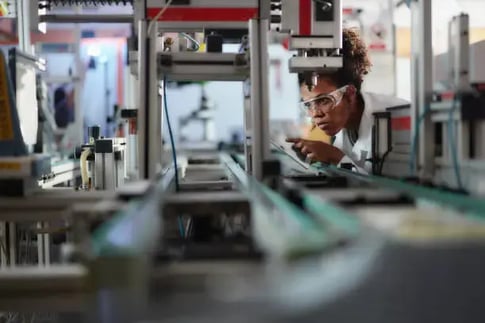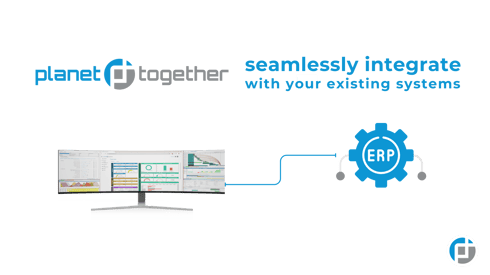
Driving Sustainable Product Innovation in Industrial Manufacturing through Smart IT Integration
The demand for sustainable products is no longer a niche movement—it’s a global mandate. From automotive components and industrial machinery to construction materials and electronics, customers and regulators alike are pushing for greener, more sustainable industrial products. For Manufacturing IT Managers, this shift isn’t just a materials challenge—it's a data and systems challenge.
The journey toward sustainability must be supported by digital transformation, intelligent automation, and seamless integration between Advanced Planning and Scheduling (APS) tools like PlanetTogether and enterprise systems such as SAP, Oracle, Microsoft Dynamics, Kinaxis, or Aveva. Together, these integrations empower IT leaders to play a pivotal role in achieving product sustainability goals—without compromising efficiency or profitability.
The Sustainability Imperative in Industrial Manufacturing
Sustainability in industrial manufacturing now encompasses more than reducing emissions or recycling waste. It’s about end-to-end product lifecycle management—from the raw materials sourced, to the energy used in production, to the recyclability of the final product. According to McKinsey, companies with strong Environmental, Social, and Governance (ESG) performance can reduce operating costs by up to 60%.
For manufacturing organizations, achieving such results means rethinking how products are designed, scheduled, and manufactured—and that starts with IT.

The Role of IT in Delivering Sustainable Products
As a Manufacturing IT Manager, you're in a unique position to champion sustainable product innovation. Your core responsibilities—ensuring data interoperability, optimizing software ecosystems, and enabling real-time visibility—are critical to turning sustainability goals into operational reality.
Here's how your IT strategy can help:
Data-Driven Decision Making
Sustainability efforts thrive on accurate, real-time data. Integrated systems ensure that data from the supply chain, production floor, and engineering departments flow seamlessly into dashboards and reports that guide environmentally conscious decisions.
Operational Efficiency through APS Tools
Reducing waste, energy consumption, and downtime directly supports sustainability goals. APS tools like PlanetTogether are essential for synchronizing production schedules, identifying bottlenecks, and lowering energy-intensive operations.
End-to-End Visibility
By connecting APS with ERP and MES systems (like SAP, Oracle, or Microsoft Dynamics), IT managers can offer leadership teams a single pane of glass to track material origin, product carbon footprint, and production energy consumption.

The Power of Integration: PlanetTogether + Enterprise Platforms
At the core of any sustainable manufacturing strategy lies integration. Here’s how combining PlanetTogether APS with enterprise systems can unlock sustainable gains:
SAP + PlanetTogether: Material Transparency and Circularity
When PlanetTogether is integrated with SAP ERP or SAP S/4HANA, manufacturing teams can trace material usage, energy input, and emissions output at every stage of production. This integration enables:
Sustainable BOM Management: Replace carbon-intensive components with sustainable alternatives using real-time cost and availability data.
Circular Supply Chains: Leverage SAP’s environment and compliance modules to ensure recycled materials meet production standards.
Oracle + PlanetTogether: Smart Scheduling for Energy Efficiency
With Oracle Cloud SCM or E-Business Suite, IT teams can tap into predictive analytics and connect with PlanetTogether to:
Optimize Machine Utilization: Avoid overloading high-energy equipment during peak hours.
Dynamic Scheduling: Use AI and historical data to plan production during low-tariff energy windows.
Microsoft Dynamics + PlanetTogether: Agile and Green
Pairing Microsoft Dynamics 365 with PlanetTogether gives manufacturers agility and sustainability through:
Real-Time Dashboards: Power BI can pull integrated APS and ERP data to monitor energy consumption, waste levels, and progress toward ESG targets.
Cloud-Based Sustainability Metrics: Reduce IT footprint by moving data operations to Microsoft Azure, a carbon-negative cloud provider.
Kinaxis + PlanetTogether: Sustainable Supply Chain Synchronization
Kinaxis excels at supply chain orchestration. Integrated with PlanetTogether, this duo can:
Model Sustainability Scenarios: Simulate supply chain routes with the lowest environmental impact.
Demand Forecasting with ESG Filters: Prioritize products and partners based on sustainability scoring.
Aveva + PlanetTogether: Process Optimization for Cleaner Production
Aveva’s strength in operational technology (OT) offers a unique advantage. Combined with PlanetTogether:
Digital Twins for Sustainability: Visualize and simulate production lines to identify inefficiencies and emissions hotspots.
Continuous Improvement: Use real-time sensor data from Aveva’s MES with PlanetTogether's planning engine to reduce scrap and energy waste.
The ROI of Sustainable IT-Driven Manufacturing
Sustainability isn’t just good for the planet—it’s good for business. Manufacturers that adopt sustainable practices through integrated IT systems report benefits such as:
Lower Operating Costs
Reduced energy consumption, fewer raw material purchases, and minimal rework or scrap.
Faster Compliance
Meet ESG reporting standards and avoid regulatory penalties with automated tracking and reporting.
Stronger Brand Reputation
Win over environmentally conscious customers and investors by showcasing measurable impact.
Increased Agility
Integrated planning systems allow for rapid adjustment to market and material changes without derailing sustainability goals.
As a Manufacturing IT Manager, your influence on sustainable product innovation is profound. By integrating tools like PlanetTogether with SAP, Oracle, Microsoft, Kinaxis, or Aveva, you're not just improving efficiency—you’re building the digital foundation for a greener future.
Industrial manufacturing may be complex, but the path to sustainability doesn’t have to be. It starts with smarter systems, seamless integration, and a shared vision for long-term impact.
Are you ready to take your manufacturing operations to the next level? Contact us today to learn more about how PlanetTogether can help you achieve your goals and drive success in your industry.























LEAVE A COMMENT